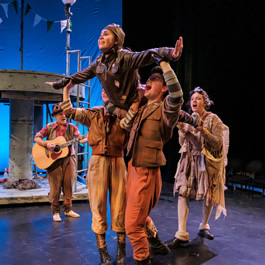The Theatre for Young Audiences (TYA) module exists to support you in the exploration of this vibrant and growing area of study. Recognizing that the arts are a vital component of the education of every young person, the TYA module allows you to heighten the synergy between active student groups (e.g. Purple Crayon Players, Griffin’s Tale), the nationally-renowned drama education community in Evanston (School District 65), the professional TYA companies in Chicago (e.g. Chicago Children’s Theatre, Adventure Stage Chicago, Child’s Play, Barrel of Monkeys, etc.), the production work in the Theatre and Interpretation Center (including our Imagine U programs), the rich archival resources in NU’s library, and the dynamic coursework offered through the School of Communication. Currently, NU graduates are working in the field as artistic directors, performers, writers, teaching artists, education directors, arts advocates, and drama specialists; in addition they are placed in the field’s top graduate programs in the country—including Harvard, New York University, the University of Texas at Austin, and Arizona State University. This module provides a concentrated study for a cohort of supportive learners with shared enthusiasm for theatre and young people; it culminates in a capstone designed to support you as you crystallize your learning and present yourself to the field.
Learning Objectives
- Demonstrate expertise in creating theatre and drama for young people
- Write effectively for the field of TYA (eg. lesson plans, study guides and other educational support materials)
- Create and execute effective lesson plans for teaching drama and for teaching through drama
- Articulate values and standards in the creation of theatre with and for young people
- Articulate an advocacy position regarding the role of the arts in the lives of young people
Courses
Theatre for Young Audiences Course Requirements
Co-Curriculars
Opportunities for application and practice on campus:
- Significant involvement with co-curricular student group focusing on TYA (e.g. Purple Crayon Players, Griffin’s Tale)
- Significant involvement with Imagine U, a Saturday morning outreach program
- Significant involvement with Northwestern University’s Center for Talent Development or JumpStart programs
Opportunities for projects, practica, and internships off campus:
- Internship with Evanston District 65 Drama Program
- Internship with professional TYA organization (e.g. Chicago Children’s Theatre, Chicago Shakespeare (Ed. Dept.), Steppenwolf TYA, Child’s Play Touring Theatre, Lifeline, Barrel of Monkeys, etc.)
Capstone
The Capstone for this module should include (but not be restricted to) the following components:
- A Professional Portfolio which must include:
- A bio
- A beginning curriculum vitae
- A letter of recommendation
- A writing sample that exemplifies your knowledge of the field
- It may also include photos, press clips, lesson plans, study guides, videos, audience feedback and programs from work performed in or produced on campus or off
- Submission of 3 Portfolios from classes taken in the modules (these will be returned to you)
- An Artistic Reflection with Professional Considerations which must include at least three of the following:
- Historical understanding of the development of the field and the individuals who contributed to the growth of the field
- Analysis of works and practices that most engage and enrage the student, and an explanation why
- Knowledge of institutions, individuals, and resources that promote the development of theatre and drama for young people
- Reflection on any production or off campus experience that speak to the challenges of artistic collaboration
- Articulation of an arts advocacy position that includes where to find resources to support the position
- An in-depth oral defense of the above points.
- Articulation of the “invisible staircase.” The invisible staircase is a series of next steps in the student’s professional and creative development. In jobs outside the arts, these steps are generally given to the individual as part of said job. Students of the arts generally have to envision those steps themselves – thus using the “invisible staircase.
Articulating those next steps includes considering the following:- What skills they’ve developed/experiences they’ve had at NU
- A list of professional attainable goals based on said skills/experiences
- A list of future goals (attainable in 3 years or beyond)

